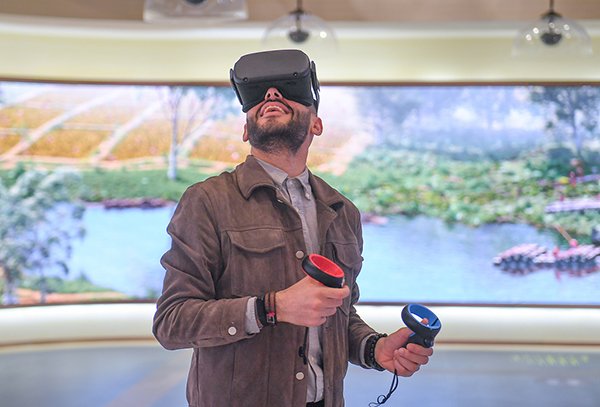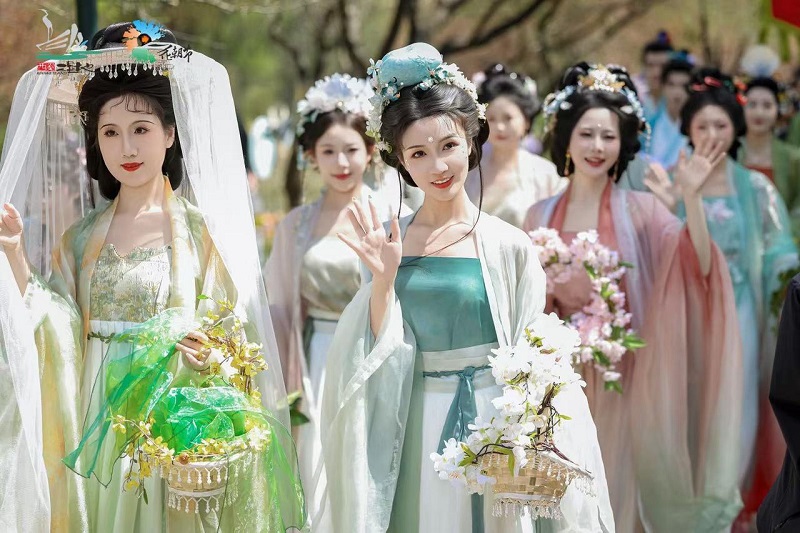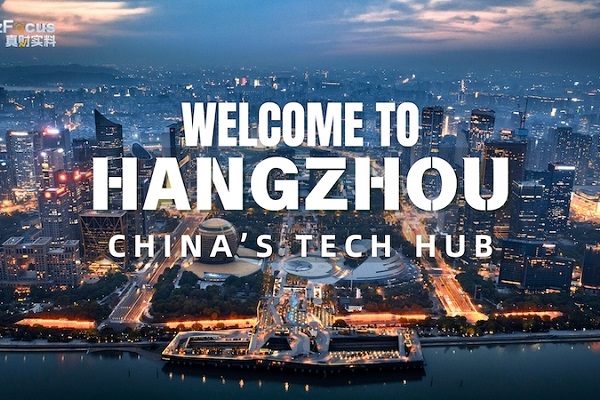Chinese museums enter metaverse to make better use of nation's cultural relics
Chinese museums have ventured into the metaverse in an attempt to find new ways to better utilize cultural relics through a series of activities and measures.

A foreigner wears a pair of VR goggles and tries to fish in the ancient way at the Liangzhu ancient city ruins park, which is themed on the Archaeological Ruins of Liangzhu City, a UNESCO World Heritage Site in Hangzhou, East China's Zhejiang province.. [Photo by Wang Gang/CFP]
The term "metaverse," one of the hottest tech buzzwords in recent days, was coined by US science fiction writer Neal Stephenson in his 1992 novel Snow Crash, which was set in a near future where the virtual world and the physical world are inextricably interconnected.
Metaverse-based non-fungible tokens (NFTs) featuring different cultural relics associated with the tiger have been launched by various museums as a way of welcoming the Year of the Tiger, and became a hot topic among Chinese people during the Spring Festival holiday this year.
Since last year, several Chinese museums, including the Hunan Museum in central China's Hunan Province and Hubei Provincial Museum in central China's Hubei Province, have launched NFTs associated with their greatest cultural relics. These NFT digital collectibles were rapidly sold out upon being marketed online.
An NFT provides a claim of authenticity or ownership over a unique digital asset that is stored on a blockchain. Each NFT has its own unique individual identity and cannot be replicated or changed, while offering the possibility of being preserved forever into the future.
Since digital assets can be traded in the metaverse, the NFT-backed digital collectibles developed by China's museums are recognized as examples of metaverse products.
In terms of technological devices and application scenarios, many museums and cultural heritage sites have gradually accessed the metaverse by introducing interactive devices to enhance the cultural experience of visitors.
The Liangzhu ancient city ruins park, which is themed on the Archaeological Ruins of Liangzhu City, a UNESCO World Heritage Site in Hangzhou, east China's Zhejiang Province, has an experience hall, where a visitor can put on a virtual reality (VR) headset and step into the ancient city of Liangzhu, toggling between the recreational VR experience and the present-day park.
The application of 3D, ultra-high-definition and other display technologies gives viewers a lifelike consumer experience in the virtual world of cultural heritage, which opens a path towards the integrated development of cultural heritage and the metaverse. Northwest China's Shaanxi Province launched a metaverse product about ancient China's Tang Dynasty (618-907). In the metaverse, visitors can go back in time and roam the streets just like those contemporaries who lived during the dynasty's reign, in addition to purchasing products. They can also invite their friends living in the physical world to go shopping with them together in the metaverse.
Thanks to the continuous advancement of digital technologies, the metaverse elements found in the cultural sector will become increasingly more diversified in the years ahead.
China will speed up digitalization and pursue its Digital China initiative, according to the country's 14th Five-Year Plan (2021-2025). Among the key industries in the digital economy listed in the plan, blockchain, artificial intelligence, VR and augmented reality (AR) are essential for promoting more diversified metaverse products.
Driven in part by the country's favorable policies, museums and scenic areas have rolled out digital experiential products, developed new types of culture and tourism services featuring immersive experiences and virtual exhibition halls, as well as holding high-definition live-streaming sessions, which will facilitate the integrated development of the metaverse and the cultural sector.
-
Xixi Wetland invites visitors to Huazhao Festival
March 25, 2025
-
Hangzhou sets standard for concert hosting
March 19, 2025
-
What is making Hangzhou the new tech powerhouse of China?
March 10, 2025
-
Inside Hangzhou: China's high-tech dream factory
March 12, 2025



